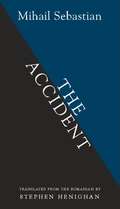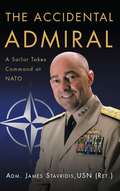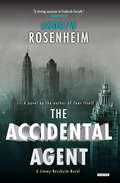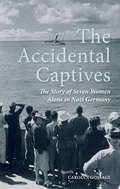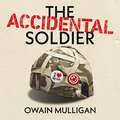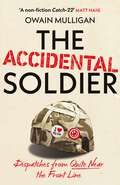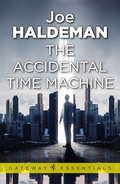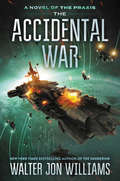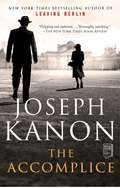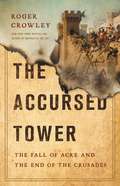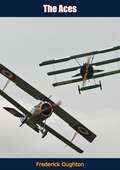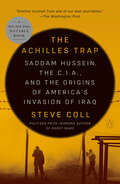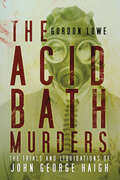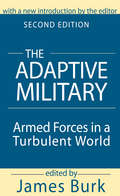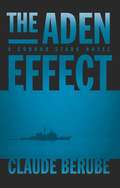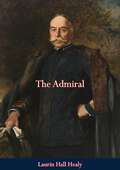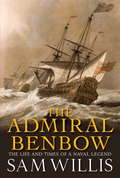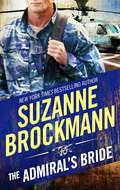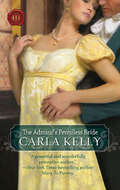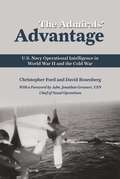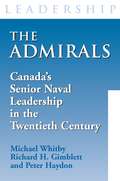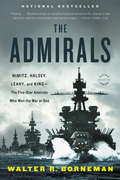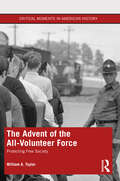- Table View
- List View
The Accident
by Stephen Henighan Mihail SebastianIn the tradition of Sándor Márai, Mihail Sebastian is a captivating Central European storyteller from the first half of the twentieth century whose work is being rediscovered by new generations of readers throughout Europe, Latin America, and the United States. The 2000 publication of his Journal 1935-1944: The Fascist Years introduced his writing to an English-speaking audience for the first time, garnering universal acclaim. Philip Roth wrote that Sebastian's Journal "deserves to be on the same shelf as Anne Frank's Diary and to find as huge a readership."Outside of the English-speaking world, Sebastian's reputation rests on his fiction. This publication of The Accident marks the first appearance of the author's fiction in English. A love story set in the Bucharest art world of the 1930s and the Transylvanian mountains, it is a deeply romantic, enthralling tale of two people who meet by chance. Along snowy ski trails and among a mysterious family in a mountain cabin, Paul and Nora, united by an attraction that contains elements of repulsion, find the keys to their fate.Mihail Sebastian (1907-1945) was born in southeastern Romania and worked in Bucharest as a lawyer, journalist, novelist, and playwright until anti-Semitic legislation forced him to abandon his public career. His long-lost diary, Journal 1935-1944: The Fascist Years, was published in seven countries between 1996 and 2007, launching an international revival of his work. Sebastian's novels and plays are available in translation throughout Europe, and also have been published in Chinese, Hindi, Bengali, and Hebrew.
The Accidental Admiral
by James StavridisDespite demonstrated prowess in the handling of ships and sailors, five years after receiving his commission, Jim Stavridis was planning on getting out of the Navy and going to law school. His assignments officer, a young lieutenant commander by the name of Mike Mullen (who would go on to become Chairman of the Joint Chiefs) noticed something special in Stavridis, however, and convinced him to stay on active duty by dangling the prospect of Uncle Sam sending him to graduate school. Going ashore for a few years, Stavridis earned his MALD and PhD in international relations from the Fletcher School of Law and Diplomacy at Tufts University. The experience that taught him to look beyond the horizon and to think and act globally. Throughout his career Stavridis was anything but uniform in the way he approached his duties. An avid reader and prolific author he wrote more than 55 articles, commentaries, and book reviews in the Navy's professional journal "Proceedings" beginning when he was still a midshipman and continuing to this day. He has also written for some of the leading papers and journals in the United States, including the, New York Times, Washington Post, Atlantic Magazine, Naval War College Review, and many others His career was marked by unusually challenging assignments including command of a U.S. Navy guided missile destroyer in the early '90s; two stints as a top aide to two different Secretaries of the Navy (one a Republican and the other a Democrat); and command of an aircraft carrier battle group. Stavridis narrowly missed being killed on September 11, 2001 when an American Airlines aircraft plunged into the Pentagon not far from his office. He was subsequently put in charge of a Navy think tank, "Deep Blue," which was tasked with reimagining the service's role in a post-9/11 environment. Already selected for his first star as 9/11 unfolded, his rise through the ranks was swift - even going directly from one-star to three-star admiral without ever wearing two stars - when he was selected to be the senior military assistant to the very demanding Secretary of Defense, Donald Rumsfeld. Surviving that crucible, he was nominated for his fourth star at the age of 50, one of the youngest persons to serve at that rank in modern history. He then became the first naval officer to lead the U.S. Southern Command - responsible for all U.S. military operations in the Caribbean and Central and South America. At the end of that assignment he was picked to be the first naval officer to serve as Supreme Allied Commander of NATO - a job first held by Dwight D. Eisenhower and then by a string of prominent generals. When he was given that assignment, the New York Times referred to Stavridis as a "renaissance Admiral," something Stavridis turned into "the accidental Admiral" given he was the first sailor to head to that command.That is where this book, "The Accidental Admiral" picks up - as Stavridis enlightens readers about securing such a position and serving as NATO's top man in uniform for four years. They were challenging years indeed. Stavridis was responsible for NATO operations in Afghanistan, its conduct of a military intervention in Libya and preparation for possible war in Syria - as well as worrying about the Balkans, cyber threats, piracy, all while cutting NATO by 30% due to budget reductions by the 28 nations of the Alliance. More than just describing the history of what happened, Stavridis shares with reader the "why" and gives insights into the personalities of those with whom he dealt, ranging from President Barack Obama; Secretary of State Hillary Clinton; Secretaries of Defense Robert Gates, Leon Panetta, and Chuck Hagel; Afghan President Hamid Karzai; Generals David Petraeus, Stanley McChrystal, John Allen and many more. The Accidental Admiral is more than just a memoir. The book is also a very personal reflection of the burdens and benefits of leadership, and Stavridis also shares his insights on strategic communications, planning, and the convergence of threats that will confront the U.S. and ...
The Accidental Agent: A Novel (The Jimmy Nessheim Novels #3)
by Andrew RosenheimAn FBI agent must stop a Nazi spy from stealing America&’s nuclear secrets in this WWII historical thriller by the author of Fear Itself. Chicago, 1942. As World War II rages overseas, special agent Jimmy Nessheim has asked for extended leave from the FBI. Becoming a law student at the University of Chicago seems like the perfect way to re-enter civilian life. But the school is home to more than an erstwhile FBI agent. Deep under the stands at Staff Field, renowned scientist Enrico Fermi is beginning work on what will become known as the Manhattan Project—nuclear research that could not only change the course of the war, but the face of war itself. When the White House learns that a Nazi agent may have infiltrated Fermi&’s staff, Nesshiem is perfectly placed to assist. Persuaded to return to duty, Nessheim is on the hunt for a traitor who may already have access to the most important military secrets of the twentieth century. Almost simultaneously, Nessheim&’s old flame Madison has found him in Chicago. But is her reappearance a coincidence? Drawn once again into a web of international intrigue, Nessheim faces his most deadly threat yet.
The Accidental Bride (Summer Island)
by Christina Skye“The Accidental Bride has something for every reader—warmth, humor . . . and chocolate. I love this book.” —Debbie Macomber, #1 New York Times–bestselling authorWhen her friends order her to take a vacation, successful chef Jilly O’Hara is less than enthused. She may be overworked, but a trip to the mountains is not her idea of fun. Especially when she’s roped into an outrageous scheme to pose as a happy bride—all to fulfill the kindly resort owner’s dreams of once again hosting a lavish wedding. But the ruggedly handsome make-believe groom may just make it tolerable . . .Walker Hale has kept to himself since his return from active duty—but the next thing he knows, he’s also playing along with the wedding charade. Even this jaded loner isn’t immune to Jilly’s quirky charm . . . or her beauty. But vacations have to end sometime, and they’ll soon have to decide if the feelings between them were more than pretend.“Rich with realistically complex characters and subtle wit . . . as warm and comforting as a well-knit afghan. Skye perfectly captures the feel and appeal of small-town life, and this sweetly satisfying romance is an excellent read-alikes suggestion for fans of Debbie Macomber’s Cedar Cove series or Robyn Carr’s Virgin River books.” —Booklist (starred review)
The Accidental Captives: The Story of Seven Women Alone in Nazi Germany
by Carolyn GossageIn April 1941, a passenger ship was attacked and sunk by Nazi Germans. This is the story of seven Canadian women survivors detained in Germany. In April 1941, seven Canadian women became prisoners of war while on a voyage from New York City to Cape Town. Their aging Egyptian liner, the Zamzam, was sunk off the coast of South Africa by the German raider Atlantis. The passengers were transferred to a prison ship and eventually put ashore in Nazi-occupied France. As "non-aliens," all 140 Americans were released after five weeks in captivity, and with the help of theLifephotographer in their midst,the news of their narrow escape became an overnight sensation.The hapless Canadians were taken to Bordeaux and became part of a group of 28 women and children interned in various German detention camps. By a stroke of luck, the Canadians eventually received permission to travel to Berlin where they were left to fend for themselves and adapt to life among "the enemy." As prisoners-at-large, they established contacts with American journalists and diplomats, an elderly Jewish professor, and even with Nazi propagandist P.G. Wodehouse. Finally, in June 1942, an exchange was arranged and the Canadians were able to board a special diplomatic Freedom Train bound for Lisbon, and from there they got back across the Atlantic to New York and new-found freedom.
The Accidental Soldier: Dispatches from Quite Near the Front Line
by Owain MulliganThis book is absolutely incredible. It made me laugh more than any book in so many years. I found the writing just so unbelievably brilliant and hilarious and affecting . . . I am crazy about it! - Marina HydeI loved it . . . relentlessly funny and really well written - John OliverAuthentic and compulsive - Richard E. GrantA fascinating insight into the often farcical chaos and catastrophe of war. Reads like a non-fiction Catch-22. Compelling, enlightening and bleakly funny. A jaw-dropping read. - Matt HaigAn instant classic - a deeply funny and mordant book about war. - Richard CurtisOwain Mulligan was never what you'd call a career soldier. Nor even a particularly good one. At weekends he trained with the Territorial Army and dreamt of swapping the mayhem of teaching in a tough school for the adventure of service in Iraq. At least they'd let him wear a helmet in Iraq.But when the job in headquarters he's been expecting doesn't materialise, he finds himself on the streets of Basra during one of the most violent periods of the conflict. Between homicidal militias, a chain of command who seem determined to get him killed, and equipment which might well do it for them, he and his men have their work cut out. It certainly puts double geography with 9E into perspective.The Accidental Soldier is a searingly honest and darkly funny account of what it was really like being in the British Army in Iraq (including all the bits they probably hoped you'd never find out). We share all the hardships, fears, and occasional lunacy of military life as Owain and his men try to navigate a war gone badly wrong. One thing's for sure; you'll never look at the phrase 'military precision' in quite the same way again...------100% of the author's royalty earnings (expected to be at least £20,000) from sales of the book in the UK & Commonwealth will be given to War Child (a registered charity, charity number 1071659) and its wholly owned subsidiary War Child Trading Limited (a registered company, company number 05100189).
The Accidental Soldier: Dispatches from Quite Near the Front Line
by Owain MulliganThis book is absolutely incredible. It made me laugh more than any book in so many years. I found the writing just so unbelievably brilliant and hilarious and affecting . . . I am crazy about it! - Marina HydeI loved it . . . relentlessly funny and really well written - John OliverAuthentic and compulsive - Richard E. GrantA fascinating insight into the often farcical chaos and catastrophe of war. Reads like a non-fiction Catch-22. Compelling, enlightening and bleakly funny. A jaw-dropping read. - Matt HaigAn instant classic - a deeply funny and mordant book about war. - Richard CurtisOwain Mulligan was never what you'd call a career soldier. Nor even a particularly good one. At weekends he trained with the Territorial Army and dreamt of swapping the mayhem of teaching in a tough school for the adventure of service in Iraq. At least they'd let him wear a helmet in Iraq.But when the job in headquarters he's been expecting doesn't materialise, he finds himself on the streets of Basra during one of the most violent periods of the conflict. Between homicidal militias, a chain of command who seem determined to get him killed, and equipment which might well do it for them, he and his men have their work cut out. It certainly puts double geography with 9E into perspective.The Accidental Soldier is a searingly honest and darkly funny account of what it was really like being in the British Army in Iraq (including all the bits they probably hoped you'd never find out). We share all the hardships, fears, and occasional lunacy of military life as Owain and his men try to navigate a war gone badly wrong. One thing's for sure; you'll never look at the phrase 'military precision' in quite the same way again...------100% of the author's royalty earnings (expected to be at least £20,000) from sales of the book in the UK & Commonwealth will be given to War Child (a registered charity, charity number 1071659) and its wholly owned subsidiary War Child Trading Limited (a registered company, company number 05100189).
The Accidental Time Machine (Gateway Essentials #316)
by Joe HaldemanGrad-school dropout Matt Fuller is toiling as a lowly research assistant at MIT when, while measuring quantum relationships between gravity and light, his calibrator disappears - and reappears, one second later. In fact, every time Matt hits the reset button, the machine goes missing twelve times longer.After tinkering with the calibrator, Matt is convinced that what he has in his possession is a time machine. And by simply attaching a metal box to it, he learns to send things through time - including a pet-store turtle, which comes back no worse for wear.With a dead-end job and a girlfriend who left him for another man, Matt has nothing to lose by taking a time machine trip for himself. So he borrows an old car, stocks it with food and water, and ends up in the near future - under arrest for the murder of the car's original owner, who dropped dead after seeing Matt disappear before his eyes. The only way to beat the rap is to continue time travelling until he finds a place in time safe enough to stop for good. But such a place may not exist...
The Accidental War: A Novel
by Walter Jon WilliamsBlending fast-paced military science fiction and space opera, the first volume in a dynamic trilogy from the New York Times bestselling author of The Praxis, set in the universe of his popular and critically acclaimed Dread Empire’s Fall series—a tale of blood, courage, adventure and battle in which the fate of an empire rests in the hands of a cadre of desperate exiles.It’s been seven years since the end of the Naxid War. Sidelined for their unorthodox tactics by a rigid, tradition-bound military establishment, Captain Gareth Martinez and Captain the Lady Sula are stewing in exile, frustrated and impatient to exercise the effective and lethal skills they were born to use in fighting the enemy.Yet after the ramshackle empire left by the Shaa conquerors is shaken by a series of hammer blows that threaten the foundations of the commonwealth, the result is a war that no one planned, no one expected, and no one knows how to end.Now, Martinez, Sula, and their confederate Nikki Severin must escape the clutches of their enemies, rally the disorganized elements of the fleet, and somehow restore the fragile peace—or face annihilation at the hands of a vastly superior force.
The Accomplice: A Novel
by Joseph Kanon&“Gripping and authentic…Kanon&’s imagination flourishes [and] the narrative propulsion is clear. A thoroughly satisfying piece of entertainment that extends a tentacle into some serious moral reflection.&” —The New York Times Book Review The &“master of the genre&” (The Washington Post) Joseph Kanon returns with a heart-pounding and intelligent espionage novel about a Nazi war criminal who was supposed to be dead, the rogue CIA agent on his trail, and the beautiful woman connected to them both.Seventeen years after the fall of the Third Reich, Max Weill has never forgotten the atrocities he saw as a prisoner at Auschwitz—nor the face of Dr. Otto Schramm, a camp doctor who worked with Mengele on appalling experiments and who sent Max&’s family to the gas chambers. As the war came to a close, Schramm was one of the many high-ranking former-Nazi officers who managed to escape Germany for new lives in South America, where leaders like Argentina&’s Juan Perón gave them safe harbor and new identities. With his life nearing its end, Max asks his nephew Aaron Wiley—an American CIA desk analyst—to complete the task Max never could: to track down Otto in Argentina, capture him, and bring him back to Germany to stand trial. Unable to deny Max, Aaron travels to Buenos Aires and discovers a city where Nazis thrive in plain sight, mingling with Argentine high society. He ingratiates himself with Otto&’s alluring but wounded daughter, whom he&’s convinced is hiding her father. Enlisting the help of a German newspaper reporter, an Israeli agent, and the obliging CIA station chief in Buenos Aires, he hunts for Otto—a complicated monster, unexpectedly human but still capable of murder if cornered. Unable to distinguish allies from enemies, Aaron will ultimately have to discover not only Otto, but the boundaries of his own personal morality, how far he is prepared to go to render justice. &“With his remarkable emotional precision and mastery of tone&” (Kirkus Reviews, starred review), Joseph Kanon crafts another compelling and unputdownable thriller that will keep you breathlessly turning the pages.
The Accursed Tower: The Fall of Acre and the End of the Crusades
by Roger CrowleyFrom a New York Times-bestselling author, a stirring account of the siege of Acre in 1291, when the last Christian stronghold fell to the Muslim army The 1291 siege of Acre was the Alamo of the Christian Crusades -- the final bloody battle for the Holy Land. After a desperate six weeks, the beleaguered citadel surrendered to the Mamluks, bringing an end to Christendom's two-hundred year adventure in the Middle East.In The Accursed Tower, Roger Crowley delivers a lively narrative of the lead-up to the siege and a vivid, blow-by-blow account of the climactic battle. Drawing on extant Arabic sources as well as untranslated Latin documents, he argues that Acre is notable for technical advances in military planning and siege warfare, and extraordinary for its individual heroism and savage slaughter. A gripping depiction of the crusader era told through its dramatic last moments, The Accursed Tower offers an essential new view on a crucial turning point in world history.
The Aces
by Frederick OughtonTHE FIRST WORLD WAR IN THE AIR…MANNOCK, McCUDDEN, VON RICHTHOFEN, UDET…TRUE STORIES OF THE GREATEST ACESAt the beginning of World War I the military potential of the airplane was completely unknown….THE ACES tells the stories of the hardy men who converted the skies over France and Germany into a modern jousting field.“The general aim of this book is twofold: to uncover the personalities of the men called ‘aces’, and to show the reader the actual birth of courage and tenacity in wartime airpower, a heritage now shared equally by the air forces of the world.”—Frederick Oughton, Introduction
The Achilles Trap: Saddam Hussein, the C.I.A., and the Origins of America's Invasion of Iraq
by Steve CollA New York Times and Washington Post Notable Book • Named a Best Book of the Year by The New Yorker&“Excellent . . . A more intimate picture of the dictator&’s thinking about world politics, local power and his relationship to the United States than has been seen before.&” —The New York Times&“Another triumph from one of our best journalists.&” —The Washington Post"Voluminously researched and compulsively readable." —Air MailFrom bestselling and Pulitzer Prize–winning author Steve Coll, the definitive story of the decades-long relationship between the United States and Saddam Hussein, and a news-breaking investigation into one of the costliest geopolitical conflicts of our time.When the United States invaded Iraq in 2003, its message was clear: Iraq, under the control of strongman Saddam Hussein, possessed weapons of mass destruction that, if left unchecked, posed grave danger to the world. But when no WMDs were found, the United States and its allies were forced to examine the political and intelligence failures that had led to the invasion and the occupation, and the civil war that followed. One integral question has remained unsolved: Why had Saddam seemingly sacrificed his long reign in power by giving the false impression that he had hidden stocks of dangerous weapons? The Achilles Trap masterfully untangles the people, ploys of power, and geopolitics that led to America&’s disastrous war with Iraq and, for the first time, details America&’s fundamental miscalculations during its decades-long relationship with Saddam Hussein. Calling on unpublished and underreported sources, interviews with surviving participants, and Saddam&’s own transcripts and audio files, Steve Coll pulls together an incredibly comprehensive portrait of a man who was convinced the world was out to get him and acted accordingly. A work of great historical significance, The Achilles Trap exposes how corruptions of power, lies of diplomacy, and vanity—on both sides—led to avoidable errors of statecraft, ones that would enact immeasurable human suffering and forever change the political landscape as we know it.
The Acid Bath Murders: The Trials and Liquidations of John George Haigh
by Gordon LoweJohn George Haigh committed five perfect murders – by dissolving his wealthy victims in sulphuric acid. Then he tipped away the resultant soup to avoid detection on a ‘no body, no murder’ principle and used his victims’ property to fund his luxury lifestyle of silk ties and flashy cars. Murder number six was less than perfect. When a guest in Haigh’s hotel disappeared, the police found half-dissolved body parts carelessly thrown into the yard outside his secluded workshop. But was the urbane Mr Haigh, the man brought up by strict Plymouth Brethren parents in Yorkshire and dressed like a city stockbroker, really the monster he said he was? Did he really kill six innocent people just so he could drink their blood? Using unpublished archive papers, including recently released letters Haigh wrote from prison while awaiting execution, author Gordon Lowe sheds light on whether Haigh’s claims were a cynical ploy for a ticket into Broadmoor Hospital, or if he was a psychopathic vampire with a penchant for disposing of his victims in acid.
The Adaptive Military: Armed Forces in a Turbulent World
by Peter Jordan Caroline LloydWhen the cold war ended, many hoped it signified enhanced prospects for a more stable world. However, despite favorable political developments, the post-cold war period has been marked by turbulence, uncertainty, and challenge. The actions of rogue states such as Iraq and North Korea have made nuclear proliferation more unpredictable. Violence in Somalia and Bosnia has cast doubt on the viability of international peacekeeping arrangements. Hopes for expanding democratization have been dimmed by assertions that the values of liberal democracy and human rights are incompatible with non-Western cultures. The Adaptive Military describes how military security policies and practices have adapted to these new times and explains why such changes are necessary.The central argument is that current conflicts have been shaped by long-term trends, which increased the number and complexity of threats that the developed world is supposed to meet, and correspondingly decreased the stock of social and political options available to meet them.Although the authors differ in their assessments about the current prospects for peace and ways to maintain security, the issues they address are as critical as they were at the end of the Cold War. Mobilizing resources and political support for remote and difficult enterprises will always remain contentious, but if we recognize the hazard of letting violence run unopposed throughout the world, then we bear some responsibility to consider how it might be checked. This volume is an exercise of that responsibility. It will be of great interest to experts in military studies and international relations.
The Aden Effect
by Claude G. BerubeAlpha team was gone, dead to a man. A few crewmen from Bravo team had been blown overboard. Stark reentered the pilothouse and checked the radio hoping to get out one last mayday, but the radio, like the crew, was dead....Connor Stark was a pariah, a man without a country, a former naval officer whose career came to an unceremonious end after a court-martial resulted in a dishonorable discharge. At home and at peace in Scotland, he was determined to leave his past behind until murder, politics, and Middle East instability prompted his unexpected recall to active duty. . Set against a background of modern piracy in the Gulf of Aden, the story begins as the new American ambassador to Yemen, C. J. Sumner, is assigned to negotiate access to the oil fields off the island of Socotra and enlists Stark's help countering pirates who are capturing ships at will off the Horn of Africa. Meeting with resistance to her diplomatic overtures, Sumner recruits Stark, who has become a mercenary after being dishonorably discharged, as her defense attaché, because he knows the region. When Stark sets up a meeting with the owner of a Yemeni shipping company and the ruling
The Admiral
by Laurin Hall Healy Luis KutnerThis book is both a complete life of Admiral George Dewey and a comprehensive history of the Navy, to which he made so large a contribution. Besides being a great mariner and fighter, Dewey was a great naval diplomat who will live in history as The Naval Statesman of America. In season and out of season Admiral Dewey advocated a Navy second to none. His supreme passion, aside from winning victories over the enemy in every engagement in which he fought, was to see the Navy of the United States strong enough and big enough to meet and defeat any possible antagonist. Long experience and technical knowledge guided his statesmanship.In the long years of his service as president of the General Board, Admiral Dewey demonstrated his knowledge of international law, diplomacy, and history, thereby not only demonstrating his versatility and high ability, but also helping to win preliminary battles of diplomacy for his country. He and his associates, notably Admiral Charles J. Badger, laid broad and deep the foundations of naval strength.
The Admiral Benbow: The Life and Times of a Naval Legend
by Sam WillisAdmiral John Benbow was an English naval hero, a fighting sailor of ruthless methods but indomitable courage. Benbow was a man to be reckoned with. In 1702, however, when Benbow engaged a French squadron off the Spanish main, other ships in his squadron failed to support him. His leg shattered by a cannon-ball, Benbow fought on - but to no avail: the French escaped and the stricken Benbow succumbed to his wounds. When the story of his 'Last Fight' reached England, there was an outcry. Two of the captains who had abandoned him were court-martialled and shot; 'Brave Benbow' was elevated from national hero to national legend, his valour immortalized in broadsheet and folksong: ships were named after him; Tennyson later fêted him in verse; in Robert Louis Stevenson's Treasure Island, the tavern where Jim Hawkins and his mother live is called 'The Admiral Benbow'. For the very first time, Sam Willis tells the extraordinary story of Admiral Benbow through an age of dramatic change, from his birth under Cromwell's Commonwealth; to service under the restored Stuart monarchy; to the Glorious Revolution of 1688; to the French wars of Louis XIV; and finally to the bitter betrayal of 1702. The Admiral Benbow covers all aspects of seventeenth century naval life in richly vivid detail, from strategy and tactics to health and discipline. But Benbow also worked in the Royal Dockyards, lived in Samuel Evelyn's House, knew Peter the Great, helped to found the first naval hospital, and helped to build the first offshore lighthouse. The second volume in the Hearts of Oak trilogy, from one of Britain's most exciting young historians, The Admiral Benbow is a gripping and detailed account of the making of a naval legend.
The Admiral Benbow: The Life and Times of a Naval Legend (Hearts of Oak Trilogy)
by Sam WillisAdmiral John Benbow was an English naval hero, a fighting sailor of ruthless methods but indomitable courage. Benbow was a man to be reckoned with. In 1702, however, when Benbow engaged a French squadron off the Spanish main, other ships in his squadron failed to support him. His leg shattered by a cannon-ball, Benbow fought on - but to no avail: the French escaped and the stricken Benbow succumbed to his wounds. When the story of his 'Last Fight' reached England, there was an outcry. Two of the captains who had abandoned him were court-martialled and shot; 'Brave Benbow' was elevated from national hero to national legend, his valour immortalized in broadsheet and folksong: ships were named after him; Tennyson later fêted him in verse; in Robert Louis Stevenson's Treasure Island, the tavern where Jim Hawkins and his mother live is called 'The Admiral Benbow'. For the very first time, Sam Willis tells the extraordinary story of Admiral Benbow through an age of dramatic change, from his birth under Cromwell's Commonwealth; to service under the restored Stuart monarchy; to the Glorious Revolution of 1688; to the French wars of Louis XIV; and finally to the bitter betrayal of 1702. The Admiral Benbow covers all aspects of seventeenth century naval life in richly vivid detail, from strategy and tactics to health and discipline. But Benbow also worked in the Royal Dockyards, lived in Samuel Evelyn's House, knew Peter the Great, helped to found the first naval hospital, and helped to build the first offshore lighthouse. The second volume in the Hearts of Oak trilogy, from one of Britain's most exciting young historians, The Admiral Benbow is a gripping and detailed account of the making of a naval legend.
The Admiral's Bride
by Suzanne BrockmannNew York Times and USA TODAY bestselling author Suzanne Brockmann has thrilled audiences with her Tall, Dark and Dangerous series. Experience it here with a hero who must face the most daring adventure of all--falling in love. Now everything is on the line... When six canisters of a lethal nerve agent are stolen from a military testing lab, it's up to Admiral Jake Robinson to infiltrate the compound where religious fanatics have stored the deadly toxin. His partner--posing as his wife--is Dr. Zoe Lange, a biological warfare specialist and an expert in espionage. And though their marriage may be a hoax, Jake's growing feelings for Zoe are anything but make-believe. With each hour he's in Zoe's company the stakes get higher, and the situation within the compound is escalating...
The Admiral's Penniless Bride
by Carla KellyA witty tale of passions and practicalities in Regency England from the “powerful and wonderfully perceptive” RITA Award–winning author (Mary Jo Putney, New York Times–bestselling author of Lady of Fortune).Sally Paul is down to her last penny. As she spends it on a cup of tea—to stave off being at the mercy of the workhouse—the last thing she expects is an offer of marriage . . . from a complete stranger!Admiral Sir Charles Bright’s seafaring days are over—and according to society, that must mean he’s in need of a wife. Discovering that Sally’s in need of a home, he offers a solution. . . . They marry in haste. But will they enjoy their wedding night at leisure?“It is always a joy to read a Carla Kelly love story. Always original, always superb.” —RT Book Reviews“Kelly has the rare ability to create realistic yet sympathetic characters that linger in the mind.” —Library Journal
The Admirals' Advantage
by David Rosenberg Christopher FordThis analytic and historical study provides a revealing look at naval operational intelligence by embracing the fundamental question of what OPINTEL is and how it answers the fundamental question "Where is the enemy, in what strength, and disposition, and what is he doing right now?" It is primarily the result of an Operational Intelligence Lessons-Learned Symposium held at the National Maritime Intelligence Training Center in Dam Neck, Virginia, 12-13 September 1998. The participants included senior intelligence professionals whose mandate was to explore the ramifications of the evolution of naval operational intelligence since World War II. Current practices were also explored with inputs from current practitioners as represented by various fleet and shore commands. Additional sources for the study were oral interviews and correspondence with senior members of the intelligence community. The authors have scrupulously taken the work as close to the edge of security classification as is possible to enhance its value without being damaging to national security.
The Admirals: Canada's Senior Naval Leadership in the Twentieth Century
by Michael Whitby Richard H. Gimblett Peter HaydonThe Admirals: Canada’s Senior Naval Leadership in the Twentieth Century fills an important void in the history of Canada’s navy. Those who carry the burden of high command have a critical niche in not only guiding the day-to-day concerns of running an armed service but in ensuring that it is ready to face the challenges of the future. Canada’s leading naval historians present analytical articles on the officers who led the navy from its foundation in 1910 to the unification in 1968. Six former Maritime Commanders provide personal reflections on command. The result is a valuable biographical compendium for anyone interested in the history of the Canadian Navy, the Canadian Forces, or military and naval leadership in general.
The Admirals: Nimitz, Halsey, Leahy, and King--The Five-Star Admirals Who Won the War at Sea
by Walter R. BornemanHow history's only five-star admirals triumphed in World War II and made the United States the world's dominant sea power. Only four men in American history have been promoted to the five-star rank of Admiral of the Fleet: William Leahy, Ernest King, Chester Nimitz, and William Halsey. These four men were the best and the brightest the navy produced, and together they led the U. S. navy to victory in World War II, establishing the United States as the world's greatest fleet. In THE ADMIRALS, award-winning historian Walter R. Borneman tells their story in full detail for the first time. Drawing upon journals, ship logs, and other primary sources, he brings an incredible historical moment to life, showing us how the four admirals revolutionized naval warfare forever with submarines and aircraft carriers, and how these men-who were both friends and rivals-worked together to ensure that the Axis fleets lay destroyed on the ocean floor at the end of World War II.
The Advent of the All-Volunteer Force: Protecting Free Society (Critical Moments in American History)
by William A. TaylorThis book examines the extensive influence of the All-Volunteer Force (AVF) on the past, present, and future of America, demonstrating how the AVF encompasses the most significant issues of military history and defense policy. Throughout the vast majority of its wars during the twentieth century, the United States relied on a mixture of volunteers who chose to serve and conscripts provided through the Selective Service System, known colloquially as the draft. When the United States emerged as a world superpower in the aftermath of World War II, U.S. policymakers also depended on the draft during peacetime. Drawing on primary source documents, this book guides readers through the transition from the draft to the AVF and analyzes its history, results, challenges, and implications. Each chapter provides an overview of the issues of the time, recounts the ensuing debates and developments around them, and examines how they manifested themselves relative to the advent of the AVF and American society during times of peace and war. Combining narrative with documents, The Advent of the All-Volunteer Force is a valuable resource for students, scholars, policymakers, and general readers interested in modern American history, military history, and the dynamic linkages between policy, politics, and American society.
